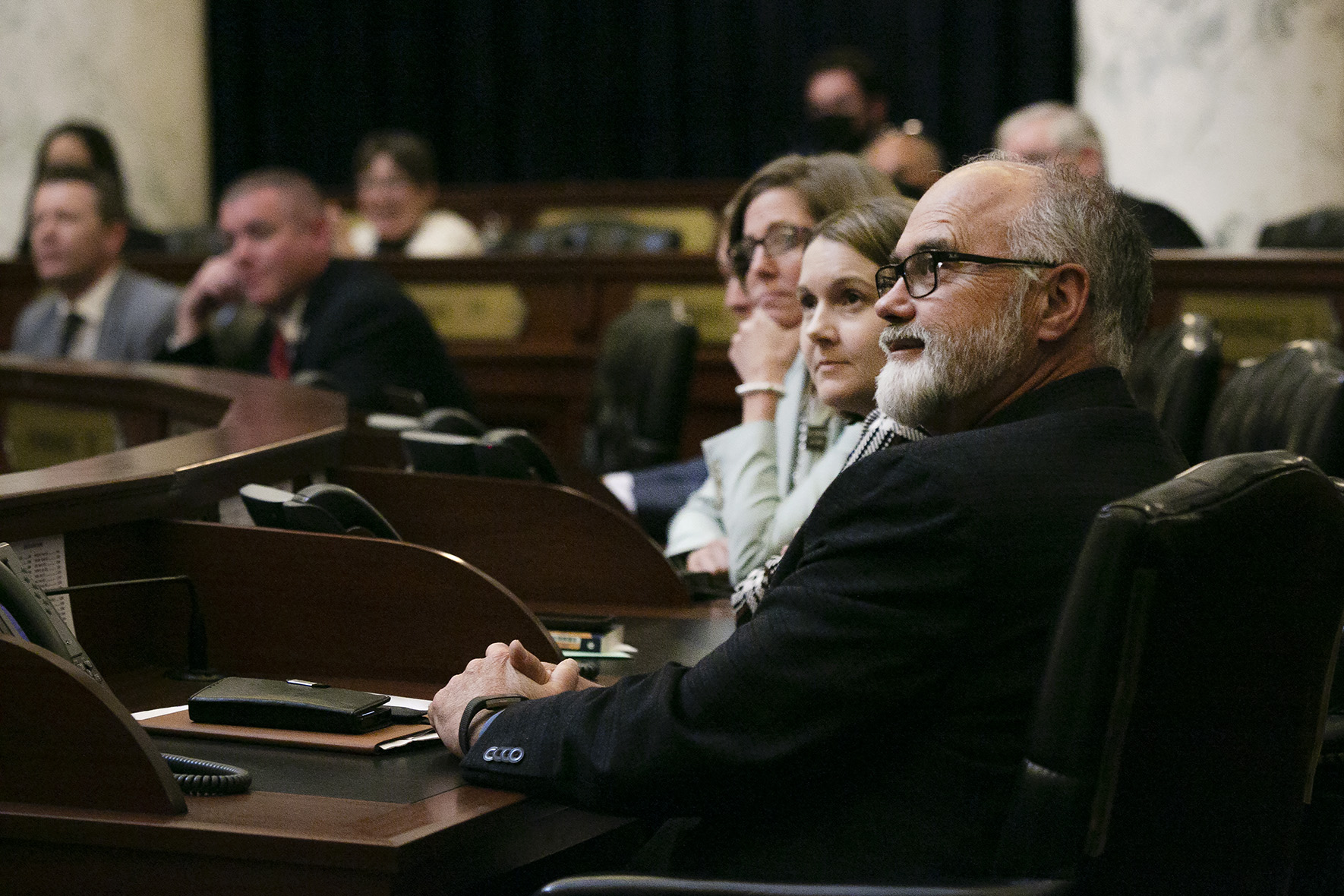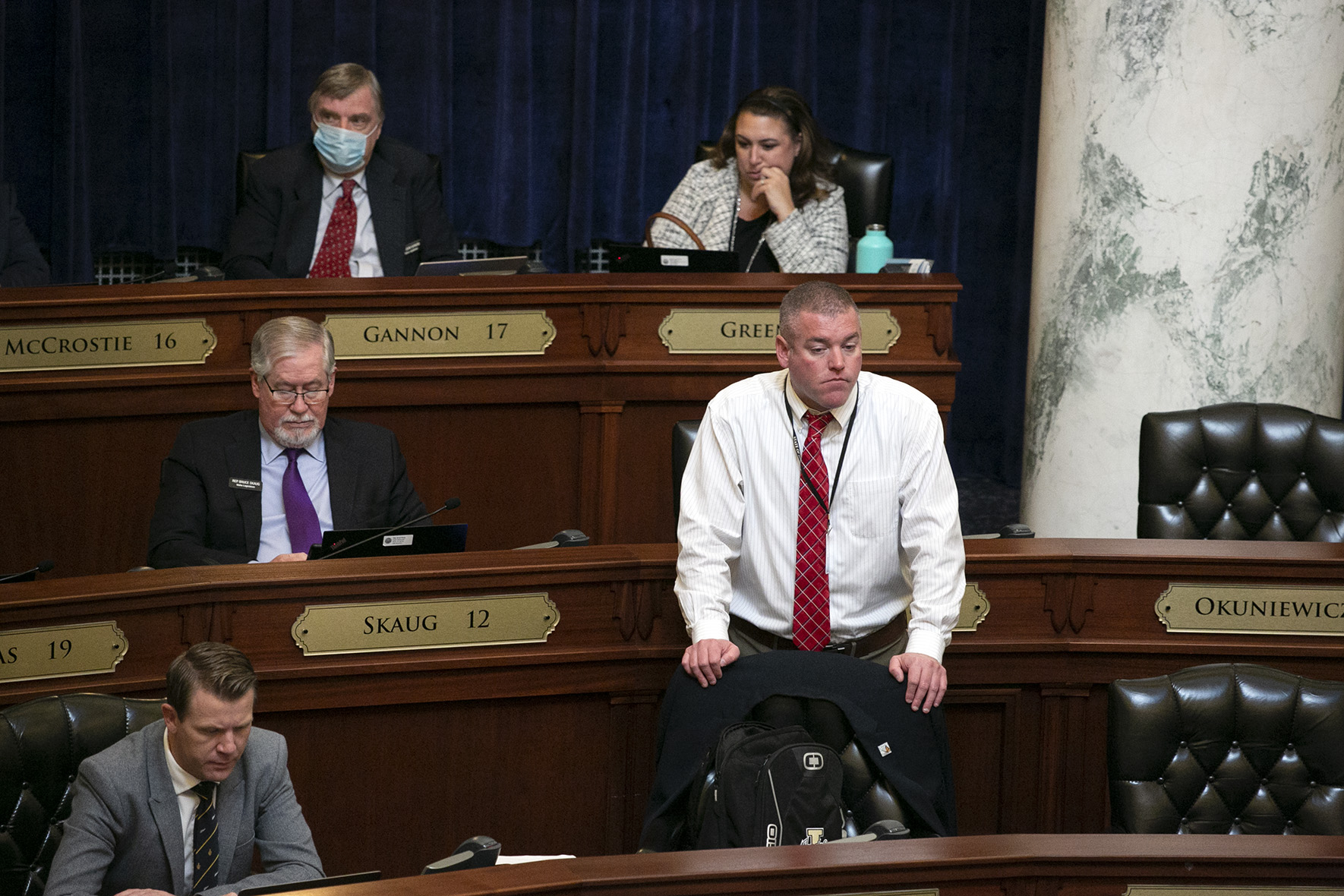Lawmakers wrapped up a record-setting 2021 session Wednesday afternoon — after an unprecedented and largely unproductive three-day return to the Statehouse.
The two houses both adjourned for the year shortly before 4 p.m. Lawmakers called it a year just 54 days before they will return to the Statehouse, for the start of the 2022 legislative session.
Because the House never actually adjourned in May, instead calling an extended and unpaid recess, Wednesday marked the end of a 311-day session, by far the longest in state history.
House members, in particular, wanted the chance to come back to address emerging coronavirus-related issues; that’s why they called a recess with a commitment to reconvene later in the year. Senators voted in May to adjourn for the year — but agreed to come back this week, as the House pushed for a session to address the Biden administration’s vaccine mandates.
Over three days, at a taxpayer cost of roughly $30,000 per day, the two houses could agree on virtually nothing. Just one piece of legislation passed both bodies: a nonbinding memorial to Washington, D.C., decrying the Biden administration’s vaccine mandates.
House Speaker Scott Bedke conceded that some of his caucus members were disgruntled by the Statehouse stalemate. But the Oakley Republican did not criticize the Senate.
“That’s how it works,” he told reporters Wednesday afternoon. “They are a deliberative body. We are a deliberative body.”
Senate President Pro Tem Chuck Winder maintained that the vaccine mandates are best addressed in court — and the state has entered three federal lawsuits opposing the mandates. Meanwhile, he said, lawmakers can revisit state pandemic policies in January.
“I think it was an interesting three days from the perspective of being able to get some ideas on the table,” said Winder, R-Boise.
House Minority Leader Ilana Rubel, D-Boise, declared the three-day session a victory of sorts, since a host of dangerous and hastily discussed bills were shelved. Given the circumstances, she said, “I think passing no legislation is by far the better option.”

How we got here
The week’s scant work product stood in stark contrast to Monday morning, when the session resumed with a dizzying flurry of legislation. Lawmakers promptly introduced some three dozen bills, including 29 in the House.
Most focused on vaccine mandates. But several proposals had direct or indirect links to education:
- House Bill 429 would have allowed parents to opt their kids out of school pandemic protocols, such as mask mandates or plexiglass partitions — and would have allowed any adult visiting or working in a school to opt out as well. Rep. Ron Nate’s bill passed the House Tuesday afternoon. But it effectively died when it did not get a hearing from the Senate State Affairs Committee. On her decision not to take it up, committee chair Sen. Patti Anne Lodge said, “As an educator with 35 years of experience, the best decisions were made by local school boards, not the decisions that were made by the Legislature or by the federal government. If (local schools) have an outbreak of COVID and they need to put masks on or something at that time, (local officials) should be deciding those issues.”
- Karey Hanks, R-St. Anthony, again came back with a bill to ban local mask mandates, including school mandates. A similar bill passed the House in the spring but did not get a Senate hearing. The House did not take up her rewritten bill.
- House Education Committee Chairman Lance Clow pitched two proposals on math, English language arts and science academic standards. One bill, co-sponsored by Senate Education Chairman Steven Thayn, would have mandated the State Board of Education to adopt new standards, as written by state review committees. Neither of the measures received a hearing.
- The House tried to codify Gov. Brad Little’s executive order blocking “vaccine passports,” tying vaccination status to public services. Rep. Jason Monks’ House Bill 421 would have banned public agencies — including K-12 schools or colleges and universities — from requiring vaccination as condition to attend events. The House passed the bill Tuesday, but it didn’t get a Senate hearing.
- Senate Democrats unveiled a bill designed to push the state to begin spending its stockpile of federal coronavirus stimulus money. Democrats want to spend the money on a variety of items, including teacher bonuses; a “sick leave bank” for teachers and other school employees; and rapid coronavirus testing and mobile vaccination clinics. The Senate State Affairs Committee held an informational session on the bill Tuesday, but took no vote. “We wanted to get it printed, get it out there with the other bills so that people could see it,” the bill’s sponsor, Sen. Grant Burgoyne, a Boise Democrat and the Senate’s assistant minority leader, told EdNews. Democrats will continue pursuing the bill in 2022, he said.
The most substantive action of the three-day session was steeped in politics. On Monday, the House voted to censure state Rep. Priscilla Giddings, stripping her of one of her committee assignments, after she shared an article identifying “Jane Doe,” the House intern who has accused former Rep. Aaron von Ehlinger of rape. In a Tuesday fundraising email, an unrepentant Giddings labeled this week’s proceedings “House Speaker Scott Bedke’s Censorship Session.”
Giddings, Bedke and former Rep. Luke Malek are all seeking the GOP’s lieutenant governor’s nomination.
Four hours, and no action
The final debate on legislation for the week — and year — took place in Senate State Affairs.
After nearly four hours of public testimony, presentations and discussion in front of a crowded hearing room, the committee killed three bills addressing the vaccine mandates, and their impacts on private employers.
The House had passed all three bills Tuesday.
But on Wednesday morning, neither House Bill 414 nor House Bill 419 even got a vote. No committee member seconded a motion to send HB 414 to the Senate floor, and no one motioned for a vote on HB 419. And House Bill 417 died when the committee voted to hold it, with only Senate Majority Leader Kelly Anthon, R-Burley.
As committee members cited flaws with the bills, Lodge said, “We know what needs to happen.”
She said lawmakers could continue working on the proposals “first thing in the next session.”
That next session, as lawmakers have frequently pointed out this week, begins on Jan. 10.

